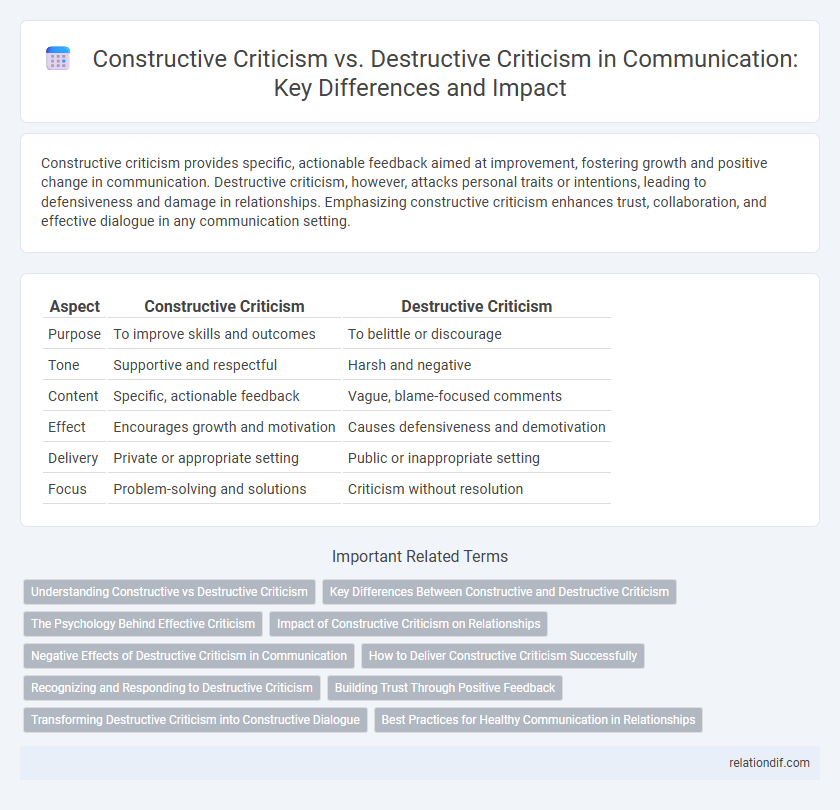Constructive criticism provides specific, actionable feedback aimed at improvement, fostering growth and positive change in communication. Destructive criticism, however, attacks personal traits or intentions, leading to defensiveness and damage in relationships. Emphasizing constructive criticism enhances trust, collaboration, and effective dialogue in any communication setting.
Table of Comparison
| Aspect | Constructive Criticism | Destructive Criticism |
|---|---|---|
| Purpose | To improve skills and outcomes | To belittle or discourage |
| Tone | Supportive and respectful | Harsh and negative |
| Content | Specific, actionable feedback | Vague, blame-focused comments |
| Effect | Encourages growth and motivation | Causes defensiveness and demotivation |
| Delivery | Private or appropriate setting | Public or inappropriate setting |
| Focus | Problem-solving and solutions | Criticism without resolution |
Understanding Constructive vs Destructive Criticism
Understanding constructive criticism involves recognizing feedback that is specific, actionable, and aimed at improvement, fostering growth and positive change. Destructive criticism, however, is often vague, personal, and demotivating, undermining confidence and impeding progress. Effective communication relies on distinguishing these types to promote a supportive environment and enhance performance.
Key Differences Between Constructive and Destructive Criticism
Constructive criticism offers specific, actionable feedback aimed at personal or professional growth, emphasizing positive change and skill improvement. Destructive criticism, however, focuses on personal attacks or vague negative comments that undermine confidence and motivation. The key difference lies in intent and delivery, where constructive feedback fosters development, while destructive remarks hinder progress and damage relationships.
The Psychology Behind Effective Criticism
Effective criticism leverages constructive feedback that fosters growth by focusing on specific behaviors rather than personal traits, aligning with psychological principles of motivation and self-efficacy. Constructive criticism activates the brain's reward centers, promoting openness and learning, whereas destructive criticism triggers stress responses that hinder cognitive processing and damage self-esteem. Understanding the psychological mechanisms behind feedback enables communicators to deliver critiques that enhance performance and maintain positive relationships.
Impact of Constructive Criticism on Relationships
Constructive criticism fosters trust and mutual respect by offering clear, actionable feedback that supports personal and professional growth. It enhances communication by encouraging open dialogue, reducing misunderstandings, and promoting collaboration. This positive approach strengthens relationships by creating an environment where individuals feel valued and motivated to improve.
Negative Effects of Destructive Criticism in Communication
Destructive criticism undermines trust and damages relationships by creating a hostile communication environment that discourages open dialogue. It often leads to decreased self-esteem, increased anxiety, and reduced motivation, negatively impacting team collaboration and productivity. Persistent exposure to destructive criticism can result in communication breakdowns, fostering resentment and disengagement among individuals.
How to Deliver Constructive Criticism Successfully
Deliver constructive criticism by focusing on specific behaviors rather than personal traits, ensuring the feedback is clear, actionable, and aimed at improvement. Use positive language that encourages growth, and balance the critique with genuine praise to maintain the recipient's motivation and self-esteem. Timing is crucial; provide feedback promptly in a private setting to foster openness and minimize defensiveness.
Recognizing and Responding to Destructive Criticism
Recognizing destructive criticism involves identifying feedback that attacks personal character or intentions rather than addressing specific behaviors or outcomes. Responding effectively requires maintaining composure, seeking clarification to understand underlying issues, and reframing the criticism into actionable insights that promote growth. Developing emotional intelligence and assertive communication skills helps transform negative interactions into opportunities for professional development.
Building Trust Through Positive Feedback
Constructive criticism fosters trust by focusing on specific behaviors and offering actionable solutions, promoting a culture of growth and collaboration. Positive feedback emphasizes strengths and achievements, reinforcing confidence and motivating continuous improvement. Balancing constructive insights with encouragement helps build strong, trusting communication channels within teams and relationships.
Transforming Destructive Criticism into Constructive Dialogue
Transforming destructive criticism into constructive dialogue involves shifting the focus from blaming to problem-solving, encouraging openness and active listening. Using specific, behavior-focused feedback rather than personal attacks fosters mutual respect and promotes growth. This approach enhances communication effectiveness and strengthens relationships by creating an environment where all parties feel heard and valued.
Best Practices for Healthy Communication in Relationships
Constructive criticism promotes healthy communication by focusing on specific behaviors and offering actionable suggestions that encourage growth and understanding. Destructive criticism, in contrast, attacks character and often leads to defensiveness and conflict, undermining trust between partners. Best practices for maintaining constructive dialogue include using "I" statements, maintaining a calm tone, and expressing empathy to foster mutual respect and emotional safety.
constructive criticism vs destructive criticism Infographic

 relationdif.com
relationdif.com